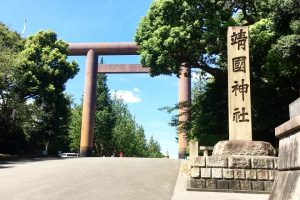August 2024 will mark 79 years since the defeat. Japan is currently in a long postwar period, perhaps rare in world history. What should be done to end the postwar period? The postwar period will not end unless the Japan-US Security Treaty, which has perpetuated the US occupation of Japan for seven years since 1945, is abolished and the US military bases in Japan are withdrawn. Everyone probably thinks so. However, in the last 30 years, voices calling for the abolition of the Security Treaty and the Status of Forces Agreement have almost disappeared from the Japanese archipelago. Voices calling for the strengthening of the "Japan-US alliance" have grown louder, the Japan-US security system has become the norm, and people seem to live under the assumption that this system will continue for a long time. The US military-industrial complex, the neocons, and the international financial capital that supports the US and UK's desire for global hegemony are at the core of the so-called warmongers. The threat of China and Russia is created by the warmongers through the media, but the majority of Japanese people genuinely hate and fear China and Russia. Japan, a defeated nation, was bound as a former enemy nation by the UN Charter created by the victorious nations, confined by the bottle cap of the Security Treaty, and was further contained by de facto membership in the US-led North Atlantic Treaty Organization (NATO). If Japan had doubled its defense spending relative to GDP as instructed by the US and become a military superpower, a triple containment awaited it. With this, it is inevitable that Japan's postwar period will continue for more than 100 years. Let's consider how this permanent defeat was created.
■ The existing order must not be changed
While the Japan-US Security Treaty system has become the norm for many Japanese, there are also many ultra-conservative and nationalist politicians who are attached to the prewar Japanese national system and values, and who hate and reject the US occupation policy towards Japan, which changed and destroyed it. However, they absolutely support the Japan-US alliance and have never hesitated to say that they are "100% with the US." This was particularly evident during the two consecutive Abe Shinzo LDP administrations. Pro-American conservatism is itself impossible and a contradiction. However, the majority of the country does not see the contradiction as a contradiction, and accepts it with a tacit understanding. To put it extremely simply, they are conforming to the majority. They value not resisting the absolute power of the time and being obedient. The "system that must not be changed" was the Empire of Japan before the war, and the Japan-US Security Treaty after the war.
Now, below is an excerpt from the beginning of an article written by a Sankei Shimbun editorial writer for a conservative magazine in 2021.
 " The New Dealers, who initially took the lead at the Supreme Commander for the Allied Powers (GHQ), which implemented the occupation policy in postwar Japan , aimed to have Japan pledge not to wage war and change the mentality of the Japanese people. The theoretical basis for their "democratization" aimed at weakening Japan was the theory of Barber Norman (pictured, with Douglas MacArthur on the left), the most authoritative Japanologist. Prewar Japan was criticized as a semi-feudal and distorted modern society, and the reason Japan waged war on the Chinese mainland was because it had consistently been an autocratic militarist nation since the Meiji Restoration, and they condemned it as all Japan's fault."
" The New Dealers, who initially took the lead at the Supreme Commander for the Allied Powers (GHQ), which implemented the occupation policy in postwar Japan , aimed to have Japan pledge not to wage war and change the mentality of the Japanese people. The theoretical basis for their "democratization" aimed at weakening Japan was the theory of Barber Norman (pictured, with Douglas MacArthur on the left), the most authoritative Japanologist. Prewar Japan was criticized as a semi-feudal and distorted modern society, and the reason Japan waged war on the Chinese mainland was because it had consistently been an autocratic militarist nation since the Meiji Restoration, and they condemned it as all Japan's fault."
The Sankei journalist openly expresses his anger and hatred at the faction of GHQ led by Herbert Norman, who condemned Japan for "everything that was wrong in the last war" and belittled modern Japan after the Meiji Restoration as worthless. Even 76 years after the war, prewar Japan is a supreme empire that should not have been transformed by a foreign power. The anachronism of this editorial writer who claims that "everything that was wrong was the occupation policy" is a typical expression of the poverty of thought among nationalist figures who gathered in organizations such as the Japan Conference, which carried Shinzo Abe on its palanquin while he was alive.
As everyone knows, the Sankei Shimbun editorial tone strongly supports the Japan-US Security Treaty system, while also taking a typical pro-American conservative stance that praises the values of prewar Japan. So how is this editorial writer trying to resolve the contradiction? He seems to have convinced himself that Norman was a communist, that the New Dealers were social democrats very close to him, and that this was resolved when they were expelled by McCarthyism after returning to their home countries . Norman was even driven to suicide in 1957 while serving as the Canadian government's ambassador to Egypt. The pro-American conservatives in Japan, who had been relieved by the Red Scare, were allowed to go along with it and used it because GHQ needed the fierce anti-communism of the pro-American conservatives, which was inseparable from the protection of the national polity, even though the US policy toward Japan after the death of the New Dealers maintained the basic principles of the Potsdam Declaration, such as "freedom of speech, religion, and thought, as well as respect for fundamental human rights" and "the removal of all obstacles to the revival and strengthening of democratic orientation among the Japanese people."
The 2022 assassination of former Prime Minister Abe, which shook the Japanese political world, and the subsequent forced dissolution of the nationalist right-wing political group Seiwa Kai (Abe faction) have resolved the contradiction of being pro-American conservative. For those around the Abe faction in Nagatacho and various circles, whoever carried out the assassination, this incident has made the pretense of being "pro-American conservative" no longer valid. The lawmakers who have covered the face of the Imperial Nation of Japan with the mask of pro-Americanism will be expelled from the ground up. Please refer to previous articles in this blog to see how the Kishida administration, which is the execution force of the expulsion, is struggling to survive. The US power center is now implying to Japan's ruling class that only those who have wiped away the remnants of the Great Japanese Empire and unconditionally follow the imperial United States, regardless of party, can survive.
The Paris Olympics demonstrated revolutionary power
 The opening ceremony of the Paris Olympics was held on July 26th. There was a performance in which Queen Marie Antoinette, who was executed during the French Revolution that began in 1789, appeared holding her own head, which had been severed by the guillotine . Red paper streamers reminiscent of bloodshed flew into the air and red smoke erupted from the windows of the Conciergerie , a former prison along the Seine where the queen lived until her execution in 1793. A woman dressed in a red dress and posing as the queen stood on the balcony holding her own head under her arm, while the revolutionary song "Sa Ira" was played. Conservative media in the US and Europe, including Japan, unanimously voiced their criticism, saying things like " It sent shock waves around the world ," "It shamelessly recalls the violence of the revolution," "It's radical and insane," and "It glorifies the death penalty, which has since been abolished . "
The opening ceremony of the Paris Olympics was held on July 26th. There was a performance in which Queen Marie Antoinette, who was executed during the French Revolution that began in 1789, appeared holding her own head, which had been severed by the guillotine . Red paper streamers reminiscent of bloodshed flew into the air and red smoke erupted from the windows of the Conciergerie , a former prison along the Seine where the queen lived until her execution in 1793. A woman dressed in a red dress and posing as the queen stood on the balcony holding her own head under her arm, while the revolutionary song "Sa Ira" was played. Conservative media in the US and Europe, including Japan, unanimously voiced their criticism, saying things like " It sent shock waves around the world ," "It shamelessly recalls the violence of the revolution," "It's radical and insane," and "It glorifies the death penalty, which has since been abolished . "
Why did the French Olympic Committee go ahead with this production, knowing that it would provoke strong reactions for and against? First of all, it is surprising that the proposal to stage this performance was approved by the Olympic Committee. As shown by the results of the recent general election in France, the left-wing coalition ultimately won over the ruling coalition that favored the elite and the wealthy, and in the UK, the Labour Party made a great advance in the general election at the same time, resulting in a change of government for the first time in 14 years. The reappearance of the laissez-faire trend that became prominent in the 1980s under Reagan and Thatcher became an ideology known as market fundamentalism and neoliberalism , and it expelled Keynesianism and social democracy, which were the foundation of socio-economic thought in the 20th century. In common terms, it is the ideology of the powerful, the super-rich, who are the aristocracy of today, who say, "I refuse to pay taxes for the poor = the weak."
 In France, the Yellow Vest movement has been taking place intermittently since 2018, protesting against laissez-faire in the 21st century. Protesters, who are said to have reached up to 300,000 people at a time, advocate civil disobedience and demand "a reduction in fuel taxes," "the reintroduction of a solidarity tax on the wealthy ," "an increase in the minimum wage ," and " the resignation of President Macron ." The protests often escalate into riots , involving traffic blockades, vandalism, and arson . The movement includes workers not represented by traditional trade unions, is not associated with any particular political party or trade union, and is said to have spread rapidly on social media . The movement has also spread to the UK. Some French media outlets have compared the Yellow Vest movement to the May 1968 revolution and the 18th century French Revolution. In response to this trend for social change, the French Olympic Committee may have been promoting Paris as the site of the most violent exercise of revolutionary rights by citizens in history.
In France, the Yellow Vest movement has been taking place intermittently since 2018, protesting against laissez-faire in the 21st century. Protesters, who are said to have reached up to 300,000 people at a time, advocate civil disobedience and demand "a reduction in fuel taxes," "the reintroduction of a solidarity tax on the wealthy ," "an increase in the minimum wage ," and " the resignation of President Macron ." The protests often escalate into riots , involving traffic blockades, vandalism, and arson . The movement includes workers not represented by traditional trade unions, is not associated with any particular political party or trade union, and is said to have spread rapidly on social media . The movement has also spread to the UK. Some French media outlets have compared the Yellow Vest movement to the May 1968 revolution and the 18th century French Revolution. In response to this trend for social change, the French Olympic Committee may have been promoting Paris as the site of the most violent exercise of revolutionary rights by citizens in history.
■Can the Meiji Era and After Be Called Modern? - The Path to Permanent Postwar
In order to call the period after the Meiji era modern Japan, it is necessary to accept the exercise of the people's right to revolution and the right to resist against the government and ruling power, as proclaimed in the American Declaration of Independence and the French Revolution. This is because the modern era is the history of the people's passion for post-medievalism and the accumulation of resistance to freedom, democracy, and respect for human rights. It is obvious that prewar Japan after the Meiji era is different from this. The Freedom and People's Rights Movement and Taisho Democracy, which did not pit monarchy against democracy, are far from the exercise of the collective right to resist by the masses. It is natural that the New Delhiists, who implemented the early occupation policy, viewed prewar Japan, where the majority of the population was made up of lower-class peasants (tenant farmers) under the absolute control of landlords, and the urban poor, who were mainly workers who had no basic labor rights, under a false constitution granted to the subjects by the Emperor, and a nominal parliamentary system, as an autocratic militarist state that pursued a distorted modernization.
On the other hand, the American Declaration of Independence, which preceded the Meiji Restoration by nearly 100 years, proclaimed the right of revolution, stating, " Governments are instituted among men, to secure certain inalienable rights, among which are life, liberty, equality , and the pursuit of happiness, and they derive their just powers from the consent of the governed; and that whenever any Form of Government becomes detrimental to these ends, the people have the right to alter or to abolish it, and to establish new Government." Even if Marx called this a "bourgeois capitalist revolution" and considered it a step below the utopian proletarian revolution , revolution as the end point of the exercise of the right of resistance is the ultimate exercise of citizenship. GHQ enacted the current constitution, implemented land reform and tenant farmer emancipation, granted basic labor rights and encouraged the labor movement, implemented democratization policies such as gender equality and women's suffrage, and changed the form of governance in Japan. For the former ruling class in Japan, it was a revolution in itself.
Governments and power structures are constantly changing and being renewed. The Potsdam Declaration that Japan accepted upon surrender states:
"The Japanese Government shall remove all obstacles to the restoration and strengthening of democratic tendencies among the Japanese people. Freedom of speech, religion, and thought, as well as respect for the fundamental human rights, shall be established.... Once these objectives have been achieved and a peace-oriented and responsible government has been established through the free will of the Japanese people, the Allied occupation forces shall immediately withdraw from Japan."
The editorial writers above, whether they are New Dealers or not, are of the opinion that it is unforgivable that the occupation policy changed the prewar Japanese national structure, and they are increasingly feeling victimized, believing that "Japan has done all the wrong." Their discourse is a refusal to accept the Potsdam Declaration, which means that the last war has not ended. This exactly overlaps with the nationalist right-wing's claim to "overthrow the Potsdam regime." For them, the prewar period has not ended, so there is no postwar period. "A peace-oriented and responsible government based on the free will of the Japanese people" was never established. The Japan-US Security Treaty was signed, and "the occupying forces did not withdraw." What exists before us is a permanent defeated regime, and the yoke of defeat.
 Right-wing politicians claim that they will protect Japan, with its unique imperial lineage that has continued for 126 generations, and restore as much of the prewar system that was destroyed by GHQ as possible . However, they do not seriously believe that "prewar Japan can be restored." There is a connection between conservative politics and vested interest groups that are deeply connected to the prewar system, such as the Association of Shinto Shrines and the religious organizations and bereaved families associations that surround it. The conservative base is their precious voting base, and they curse the "changed Japan" for the sake of their own interests. To be precise, the beneficiaries of the absolutist imperial state since the Meiji era have propagandized those interests as if they were the interests of the entire nation.
Right-wing politicians claim that they will protect Japan, with its unique imperial lineage that has continued for 126 generations, and restore as much of the prewar system that was destroyed by GHQ as possible . However, they do not seriously believe that "prewar Japan can be restored." There is a connection between conservative politics and vested interest groups that are deeply connected to the prewar system, such as the Association of Shinto Shrines and the religious organizations and bereaved families associations that surround it. The conservative base is their precious voting base, and they curse the "changed Japan" for the sake of their own interests. To be precise, the beneficiaries of the absolutist imperial state since the Meiji era have propagandized those interests as if they were the interests of the entire nation.
Now, the "system that must not be changed" has been narrowed down to the Japan-US Security Treaty. In other words, the postwar period is moving towards permanence. Japan, which has once again become a military superpower, must wipe out the remnants of the "Great Japanese Empire." Washington is warning:
The day after the opening ceremony of the Paris Olympics, where we witnessed the spirit of the French Revolution being passed down through the generations, I felt a chill down my spine as the Japanese delegation hummed the national anthem at the awards ceremony for the Olympic Games.
